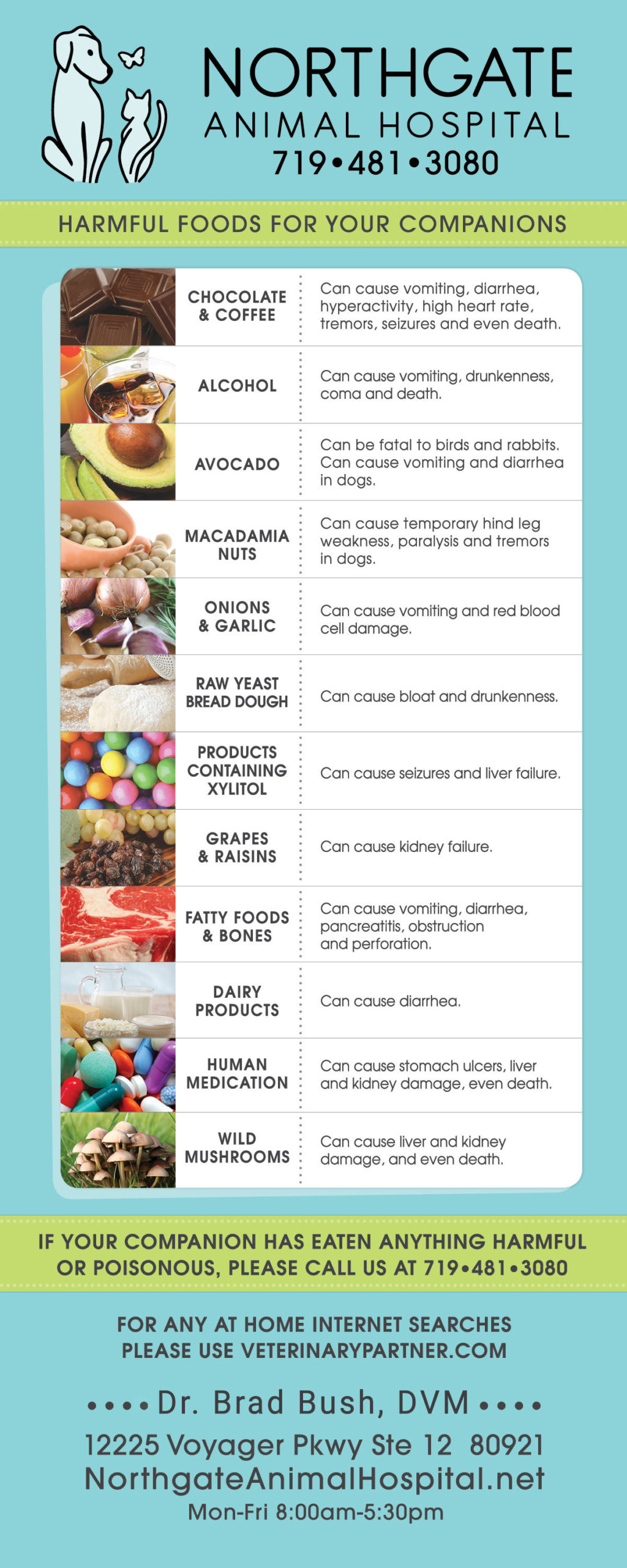

What should I do in an emergency?
If your furry friend has an emergency – bleeding, trauma, difficulty breathing, collapse, suspected poison – please call us immediately and prepare to transport your companion to Northgate Animal Hospital as soon as possible.
If it is before 8:00 am or after 5:30 pm please contact:
North Animal Emergency Care Center
5520 N. Nevada Ave
719-260-7141
www.animalercare.com
Powers Pet Emergency
5886 Tutt Blvd
719-473-0482
www.powerspetemergency.com
South Animal Emergency Care Center
3775 Airport Rd
719-578-9300
www.animalercare.com
Why not anesthesia-free dental cleanings?
Click here for a detailed article explaining why anesthesia-free dental cleanings are not appropriate.
Harmful foods for your companion
There are many things that dogs eat over their lifetime, and many of them can cause serious illness. The most common poisonings occur with ingestion of chocolate, rat poison, and antifreeze. There are also many other foods and products found around most households that can cause serious illness including onions, grapes, raisins, gum (with xylitol), Gorilla glue, aspirin, ibuprofen, acetaminophen, and coins (especially pennies). If you believe your dog may have eaten any of the above, please call us right away.
Come in for a free NGAH Harmful Foods magnet! (see image)
Rodenticide Poisoning
With so much rain and green growth, many people look to rodenticides and baits to control pests in and around their homes. There is no rodenticide or bait that is safe for use around dogs or cats, no matter what rodent control companies may say, it is impossible to completely guard against accidental ingestion of deadly toxins by furry companions.
In the case of accidental ingestion call us immediately at 719-481-3080. If we are unavailable, please call either Animal Emergency Care Center North at 719-260-7141 or Powers Pet Emergency at 719-473-0482.
Signs of poisoning may include:
- vomiting
- diarrhea
- decreased energy
- decreased appetite
- bleeding from the nose or blood in urine
- black or blood tinged poop
Toxic and Non-Toxic Plants
There are over 1,000 poisonous plants to keep your furry friend away from. Click here to see the entire list from the ASPCA.
What should I do when my dog has diarrhea?
The most common causes of diarrhea in dogs are sudden changes in diet, a fatty treat (even a little piece), internal parasites (worms), stress, and illness. Your dog should be seen by a veterinarian to check for internal parasites (fecal exam) and to diagnose more significant illness. Sometimes ‘resting’ the GI tract with a bland diet of boiled hamburger or boneless/skinless chicken and white rice for a few days will get the system back on track. It is very important to pour off the boiled water containing the fat. An animal with diarrhea lasting longer than 24 hours often needs medical assistance to resolve the intestinal upset.
My companion is acting out?
Sometimes problems that first appear to be behavioral are actually medical. Examples of this include inappropriate urination (cats and dogs) and sometimes biting/aggression. We have diagnosed sterile urinary bladder inflammation, urinary tract infections and bladder stones in some animals thought to be urinating as a behavioral issue. We have found painful diseased teeth in some cats and dogs that have begun to bite or be aggressive. With proper evaluation, diagnosis and treatment, these animals resume a happy and healthful life. We also treat animals with true behavioral issues to improve their lives and maintain the family bond.
Nutrition Information for your companion:
A common misconception among pet owners is that dogs are obligate carnivores and require food that consists mostly of meat. This is not true. Dogs, like people, are omnivores and do best when they eat a balance of protein, carbohydrates, and fat. Excessive protein consumption is unnecessary for dogs and can actually be harmful. Cats are obligate carnivores, which means they must have primarily a protein and fat based diet with some carbohydrates.
CANINE NUTRITION
AS RECOMMENDED BY COLORADO STATE UNIVERSITY
Puppy – Protein: 22-30%, Fats: 8-12%, Carbohydrates: 40-60%
Adult & Senior – Protein: 18-30%, Fats: 5-10%,Carbohydrates: 40-60%
FELINE NUTRITION
Kitten – Protein: 30-35%, Fats: 9-18%, Carbohydrates: 30-50%
Adult & Senior – Protein: 26-30%, Fats: 9-18%, Carbohydrates: 30-50%
If you have any questions regarding your companion’s food please call us at 719-481-3080.
